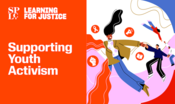Supporting Youth Activism


How can history help us resist hate in society today and work toward a more inclusive future? Opposition to equality is, unfortunately, not new to the history of the United States. Recognizing the relevance of history to today’s justice movements is crucial for understanding and countering current pushbacks against democratic values. And with the intense efforts to dismantle public education and to erase and alter our country’s history, teaching accurate history — including the hard truths of our nation’s past — is essential.
Schools should be safe and welcoming for all children—on this point responsible adults agree. But currently, discriminatory laws and censorship policies threaten the well-being of children. LGBTQ+ young people and families are being targeted, along with Black, Indigenous and other people of color and members of historically marginalized groups, whose histories and experiences are being misrepresented and erased.